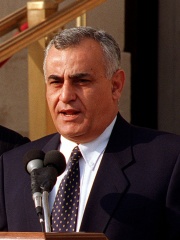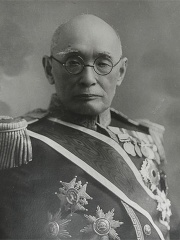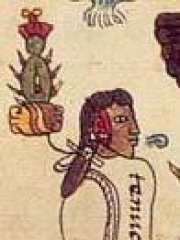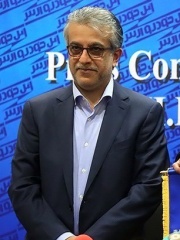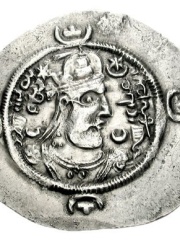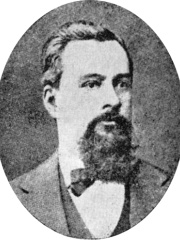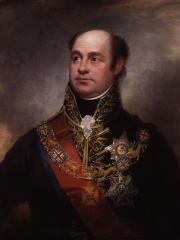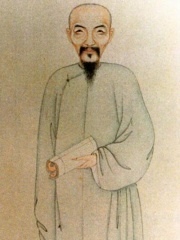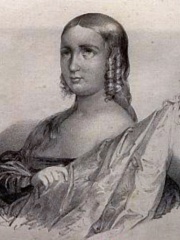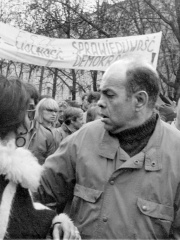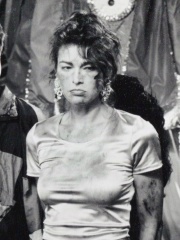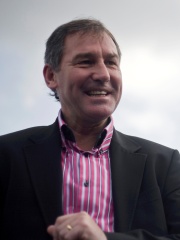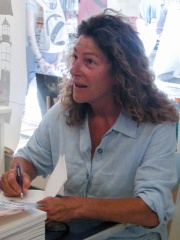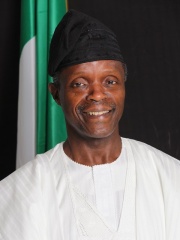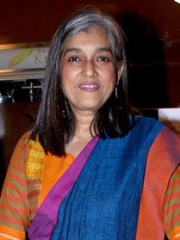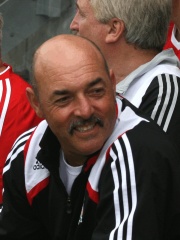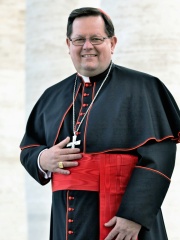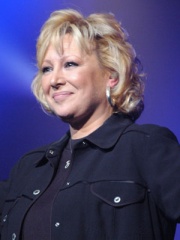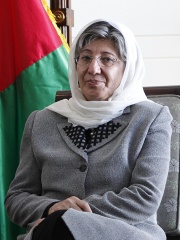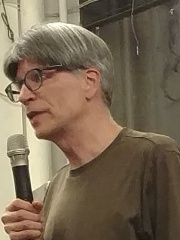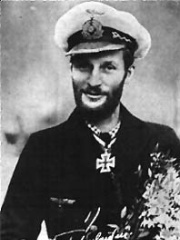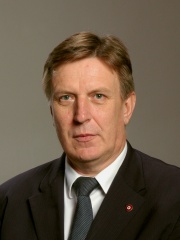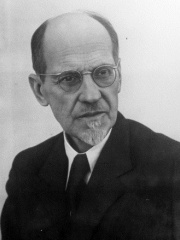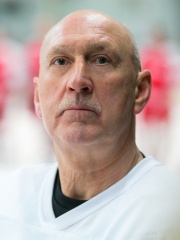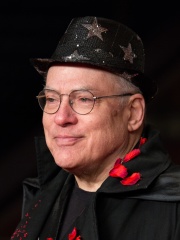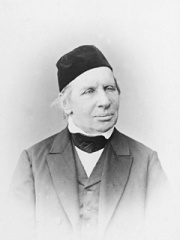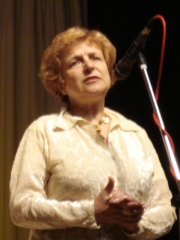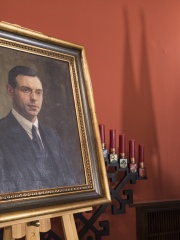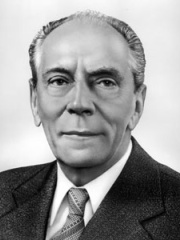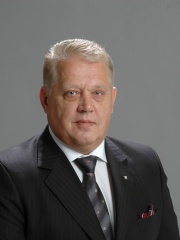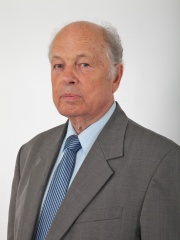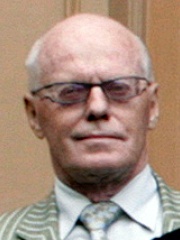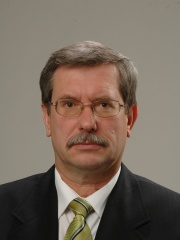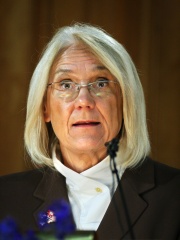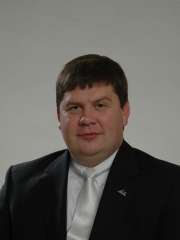POLITICIAN
Andris Piebalgs
1957 - Today
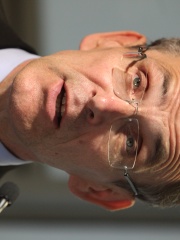
 Andris Piebalgs
Andris Piebalgs
Andris Piebalgs (born 17 September 1957) is a Latvian politician and diplomat who served as European Commissioner for Development at the European Commission from 2010 until 2014. Between 2004 and 2009 he served as Commissioner for Energy. Between 4 June 2016 and 19 August 2017, he served as the leader of the Unity party. Read more on Wikipedia
His biography is available in 24 different languages on Wikipedia. Andris Piebalgs is the 13,796th most popular politician (up from 15,172nd in 2024), the 127th most popular biography from Latvia (up from 158th in 2019) and the 37th most popular Latvian Politician.
Memorability Metrics
Page views of Andris Piebalgs by language
Among POLITICIANS
Among politicians, Andris Piebalgs ranks 13,796 out of 19,576. Before him are Yitzhak Mordechai, Makino Nobuaki, Tenoch, Salman bin Ibrahim Al Khalifa, Vistahm, and Emperor Zhi. After him are Cándido Bareiro, William Beresford, 1st Viscount Beresford, Ji Yun, Mariana Pineda, Pierre Frieden, and Jacek Kuroń.
Most Popular Politicians in Wikipedia
Go to all RankingsYitzhak Mordechai
1944 - Present
HPI: 57.36
Rank: 13,796
Makino Nobuaki
1861 - 1949
HPI: 57.36
Rank: 13,797
Tenoch
1299 - 1376
HPI: 57.36
Rank: 13,798
Salman bin Ibrahim Al Khalifa
1965 - Present
HPI: 57.36
Rank: 13,799
Vistahm
HPI: 57.36
Rank: 13,800
Emperor Zhi
HPI: 57.35
Rank: 13,801
Andris Piebalgs
1957 - Present
HPI: 57.35
Rank: 13,802
Cándido Bareiro
1833 - 1880
HPI: 57.35
Rank: 13,803
William Beresford, 1st Viscount Beresford
1768 - 1854
HPI: 57.35
Rank: 13,804
Ji Yun
1724 - 1805
HPI: 57.35
Rank: 13,805
Mariana Pineda
1804 - 1831
HPI: 57.35
Rank: 13,806
Pierre Frieden
1892 - 1959
HPI: 57.35
Rank: 13,807
Jacek Kuroń
1934 - 2004
HPI: 57.35
Rank: 13,808
Contemporaries
Among people born in 1957, Andris Piebalgs ranks 233. Before him are Joanna Pacuła, Bryan Robson, Florence Arthaud, Fulvio Collovati, Yemi Osinbajo, and Ratna Pathak. After him are Bruce Grobbelaar, Tomoko Ohara, Gérald Lacroix, Marie Myriam, Sima Samar, and Richard Powers.
Others Born in 1957
Go to all RankingsJoanna Pacuła
ACTOR
1957 - Present
HPI: 57.51
Rank: 227
Bryan Robson
SOCCER PLAYER
1957 - Present
HPI: 57.49
Rank: 228
Florence Arthaud
POLITICIAN
1957 - 2015
HPI: 57.45
Rank: 229
Fulvio Collovati
SOCCER PLAYER
1957 - Present
HPI: 57.40
Rank: 230
Yemi Osinbajo
POLITICIAN
1957 - Present
HPI: 57.38
Rank: 231
Ratna Pathak
ACTOR
1957 - Present
HPI: 57.38
Rank: 232
Andris Piebalgs
POLITICIAN
1957 - Present
HPI: 57.35
Rank: 233
Bruce Grobbelaar
SOCCER PLAYER
1957 - Present
HPI: 57.30
Rank: 234
Tomoko Ohara
SOCCER PLAYER
1957 - Present
HPI: 57.30
Rank: 235
Gérald Lacroix
RELIGIOUS FIGURE
1957 - Present
HPI: 57.25
Rank: 236
Marie Myriam
SINGER
1957 - Present
HPI: 57.22
Rank: 237
Sima Samar
POLITICIAN
1957 - Present
HPI: 57.21
Rank: 238
Richard Powers
WRITER
1957 - Present
HPI: 57.20
Rank: 239
In Latvia
Among people born in Latvia, Andris Piebalgs ranks 127 out of 323. Before him are Jānis Daliņš (1904), Hans-Diedrich von Tiesenhausen (1913), Anna Brigadere (1861), Anatoly Solovyev (1948), Māris Kučinskis (1961), and Augusts Kirhenšteins (1872). After him are Helmuts Balderis (1952), Rosa von Praunheim (1942), Astrid Ivask (1926), Otto August Rosenberger (1800), Tatjana Ždanoka (1950), and Jānis Ivanovs (1906).
Others born in Latvia
Go to all RankingsJānis Daliņš
ATHLETE
1904 - 1978
HPI: 57.73
Rank: 121
Hans-Diedrich von Tiesenhausen
MILITARY PERSONNEL
1913 - 2000
HPI: 57.63
Rank: 122
Anna Brigadere
WRITER
1861 - 1933
HPI: 57.57
Rank: 123
Anatoly Solovyev
ASTRONAUT
1948 - Present
HPI: 57.51
Rank: 124
Māris Kučinskis
POLITICIAN
1961 - Present
HPI: 57.50
Rank: 125
Augusts Kirhenšteins
POLITICIAN
1872 - 1963
HPI: 57.42
Rank: 126
Andris Piebalgs
POLITICIAN
1957 - Present
HPI: 57.35
Rank: 127
Helmuts Balderis
POLITICIAN
1952 - Present
HPI: 57.26
Rank: 128
Rosa von Praunheim
FILM DIRECTOR
1942 - Present
HPI: 57.20
Rank: 129
Astrid Ivask
WRITER
1926 - 2015
HPI: 57.17
Rank: 130
Otto August Rosenberger
ASTRONOMER
1800 - 1890
HPI: 57.13
Rank: 131
Tatjana Ždanoka
POLITICIAN
1950 - Present
HPI: 57.12
Rank: 132
Jānis Ivanovs
COMPOSER
1906 - 1983
HPI: 57.10
Rank: 133
Among POLITICIANS In Latvia
Among politicians born in Latvia, Andris Piebalgs ranks 37. Before him are Zigfrīds Anna Meierovics (1887), Arvīds Pelše (1899), Andris Bērziņš (1951), Alfrēds Rubiks (1935), Māris Kučinskis (1961), and Augusts Kirhenšteins (1872). After him are Helmuts Balderis (1952), Tatjana Ždanoka (1950), Valdis Birkavs (1942), Indulis Emsis (1952), Laila Freivalds (1942), and Aigars Kalvītis (1966).
Zigfrīds Anna Meierovics
1887 - 1925
HPI: 58.47
Rank: 31
Arvīds Pelše
1899 - 1983
HPI: 58.30
Rank: 32
Andris Bērziņš
1951 - Present
HPI: 58.21
Rank: 33
Alfrēds Rubiks
1935 - Present
HPI: 58.00
Rank: 34
Māris Kučinskis
1961 - Present
HPI: 57.50
Rank: 35
Augusts Kirhenšteins
1872 - 1963
HPI: 57.42
Rank: 36
Andris Piebalgs
1957 - Present
HPI: 57.35
Rank: 37
Helmuts Balderis
1952 - Present
HPI: 57.26
Rank: 38
Tatjana Ždanoka
1950 - Present
HPI: 57.12
Rank: 39
Valdis Birkavs
1942 - Present
HPI: 54.83
Rank: 40
Indulis Emsis
1952 - Present
HPI: 54.32
Rank: 41
Laila Freivalds
1942 - Present
HPI: 54.23
Rank: 42
Aigars Kalvītis
1966 - Present
HPI: 54.11
Rank: 43
